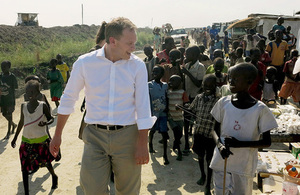Shapps: South Sudan facing worsening crisis and famine
UK will help South Sudan avoid a famine as conflict, droughts and poor harvests have created one of the world’s worst humanitarian crises.

International Development Minister Grant Shapps visits Malakal, South Sudan. Picture: Iain McLellan/IOM
The UK will provide new support to help South Sudan avoid a famine as conflict, droughts and poor harvests have created one of the world’s worst humanitarian crises, International Development Minister Grant Shapps has announced.
Following a visit to communities in the north of the country, Minister Shapps reaffirmed the UK’s ongoing humanitarian commitment to South Sudan and pledged a further £20 million to help 400,000 people become more resilient to extreme weather events like drought.
Announced in the same week the Prime Minister committed to target at least half of DFID’s budget on stabilising and supporting broken and fragile states and regions, the UK’s new support will help bring stability to the region and prevent challenges from spreading further afield.
In pictures: UK aid in South Sudan
Almost 4 million people are facing severe food shortages - an 80 per cent increase on this time last year. 30,000 people are already believed to be experiencing starvation in Unity State.
Grant Shapps said:
It is clear there is an urgent and deepening crisis in South Sudan.
More people than ever before are facing severe and catastrophic food shortages and without additional relief the world’s newest country faces a very real risk of famine.
Britain’s aid will save many lives and help stabilise one of the world’s most fragile countries, helping them cope better with future shocks like droughts and food shortages.
South Sudan can only build a safer, more peaceful and prosperous future when its peace agreement is implemented in full and aid agencies are given the unrestricted access they need to do their jobs.
The UK’s new £20 million funding will help villages and communities in the Greater Bahr el Ghazal, Lakes and Equatoria regions to buy or receive food while boosting local agriculture and farming to ensure people can better cope with future disasters and reduce their dependency on emergency over time.
Working through UN’s World Food Programme, Food and Agricultural Organisation and other partners, the new support from Britain will provide food or small amounts of cash in return for work which helps communities become more resilient. The work programmes will include:
- planting trees to create a more sustainable source of fuel for cooking or for communities’ and schools’ wood reserves
- constructing flood control dykes to protect fields, roads and villages from weather shocks
- building watering ponds for livestock and irrigation ditches for farms
The UK is the second largest bilateral humanitarian donor to South Sudan. Since December 2013, we have contributed £242 million to the humanitarian response and a further £89 million to South Sudanese refugees in the region.
This aid is already providing lifesaving food, water, sanitation and hygiene, health, nutrition, shelter and emergency relief items for millions of people. Our humanitarian support is focused on the Greater Upper Nile region where fighting continues, shocking human rights abuses are reported and humanitarian needs are severe and urgent. The UK’s response is also helping hundreds of thousands of vulnerable people prepare, cope with and recover from conflict or natural hazards.
South Sudan is one of the world’s most dangerous places to be a humanitarian aid worker. In addition to recent reports by the African Union of severe human rights abuses, humanitarian access remains heavily restricted and at least 39 humanitarian aid workers have been killed since the current crisis began in December 2013.
Over 2.3 million people have fled their homes, including more than 1.6 million displaced inside South Sudan and more than 640,000 seeking refuge in neighbouring countries.
General media queries (24 hours)
Email mediateam@dfid.gov.uk
Telephone 020 7023 0600
If you have an urgent media query, please email the DFID Media Team on mediateam@dfid.gov.uk in the first instance and we will respond as soon as possible.